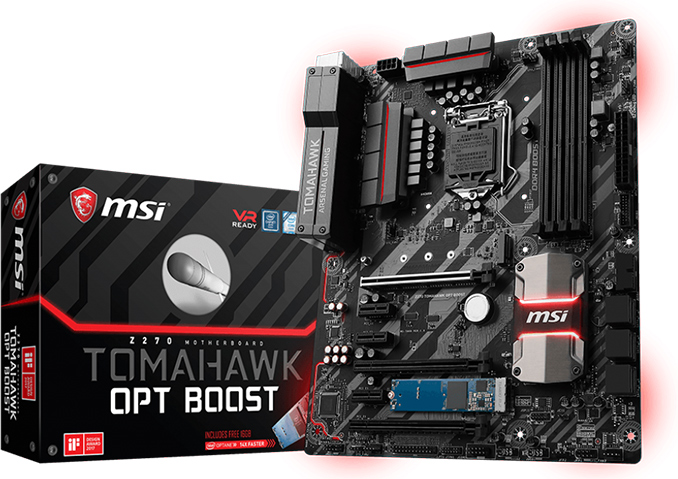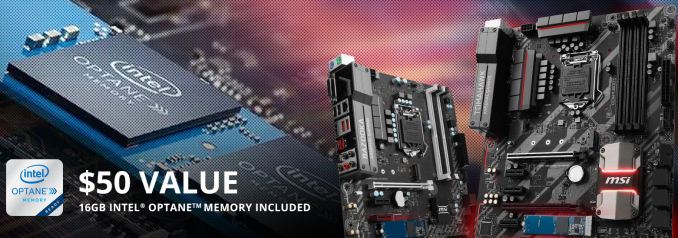MSI to Bundle Intel Optane Memory 16 GB Cache Drives with Select Motherboards
by Anton Shilov on April 28, 2017 2:00 PM EST
MSI this week announced plans to bundle Intel Optane Memory 16 GB caching drives with select Intel 200-series chipset motherboards. The company claims that the drives will not increase prices of motherboards significantly, but will bring tangible performance benefits when it comes to boot times and application launches versus systems employing HDDs.
MSI will add Intel’s Optane Memory 16 GB drives to its Z270 Tomahawk Opt Boost, B250M Bazooka Opt Boost, as well as B250M Pro Opt boost motherboards, which means the company will be hitting gaming, mainstream, and commercial PCs. The consumer Intel Optane Memory caching drives were not designed to replace conventional SSDs, but were developed to enable hybrid storage solutions featuring fast solid-state memory as well as a slower storage device with SATA interface (i.e., an HDD, but SSHDs and even SATA SSDs are formally supported as well). The Intel Optane Memory 16 and 32 GB drives cache frequently used data (i.e., frequently used LBA sectors where Windows boot files and frequently launched applications reside) with the help of Intel’s software and PCH and therefore speed up PCs with mechanical hard drives. Performance-wise, Intel’s Optane Memory 16 GB drive offers up to 900 MB/s sequential read and up to 145 MB/s sequential write speed, but keeping in mind that the drive is used for caching, random read speeds and overall read latency are what matter most.
| Intel Optane Memory Specifications | ||
| Capacity | 16 GB | 32 GB |
| Form Factor | M.2 2280 B+M key | |
| Interface | PCIe 3.0 x2 | |
| Protocol | NVMe 1.1 | |
| Controller | Intel | |
| Memory | 128 Gb 20nm Intel 3D XPoint | |
| Sequential Read | 900 MB/s | 1350 MB/s |
| Sequential Write | 145 MB/s | 290 MB/s |
| Random Read | 190k IOPS | 240k IOPS |
| Random Write | 35k IOPS | 65k IOPS |
| Read Latency | 7µs | 9 µs |
| Write Latency | 18µs | 30 µs |
| Active Power | 3.5 W | 3.5 W |
| Idle Power | 1 W | 1 W |
| Endurance | 182.5 TB | 182.5 TB |
| Warranty | 5 years | |
| MSRP | $44 | $77 |
While MSI bundles the Optane Memory 16 GB drives with select 200-series motherboards, it should be noted that the drives are only supported by Intel’s Core i-series Kaby Lake processors (so, no Celeron or Pentium) and Microsoft Windows 10 64-bit OS. In addition, the Optane Memory drive must be supported by the UEFI firmware of the motherboard.
Based on our own test results, Intel’s Optane Memory 32 GB caching drive can bring performance an HDD-based system up to the level of mainstream SSDs in SYSmark, but like most hybrid storage sub-systems, this happens only with frequently used files or programs. The good news is that Intel’s Optane 16 GB SSD (retail $47) comes for free(ish) with select MSI’s motherboards, essentially bringing an inexpensive performance improvement to equally inexpensive systems with HDDs.
Related Reading:
Source: MSI











18 Comments
View All Comments
rocky12345 - Friday, April 28, 2017 - link
I was all excited about these drives until I found out that Intel is not sharing the tech and AMD won't be getting to use it in their Ryzen platform at all. I plan on getting Ryzen 2 in a year and thought hey one of these little 32GB cache drives would be a nice speed booster. BUt the guy form AMD on another site confirmed that Intel owns the hardware rights and is not sharing it. He went on as far to say if you got a SSD drive why would you need it anyway. He is right and wrong in the review I read it showed the 32Gb version making a Spindle HDD work at SSD speed like speed in reads and a bit faster in writes but it also showed that if you have a sata SSD it even uplifts the performance for them a bit as well because of the 600MB's speed limit on the Sata bus. Oh well I guess a new NVMe drive is in the works for my next build...lolfanofanand - Friday, April 28, 2017 - link
Instead of listening to your buddy or some random person in a forum, try reading Anandtech's review of the product. Optane caches are pretty much worthless unless all you do is e-mail and surf the webz.haukionkannel - Saturday, April 29, 2017 - link
According to Anandtech rewiev optane cache is quite usefull... I have a guite a lot games in normal HD and only one or two in ssd, so this would speed up my game leads considerably.Samus - Saturday, April 29, 2017 - link
It is completely useless and not cost effective simply because1) it doesn't consistently bring the speed of an HDD to SSD levels
2) Optane + HDD is more expensive than a system with a decent sized SSD
3) it adds power consumptions and footprint so it is a far fetched mobile solution, where it could have potentially been successful since these systems typically only fit one drive
4) it works with one platform, one series of CPU from one generation, and one operating system
5) the systems that benefit most are office and home PC's where large storage capacity is not needed. Just get a 275GB $90 SSD instead of a 2TB $90 HDD with capacity most of the target applications don't need.
ironargonaut - Wednesday, May 3, 2017 - link
What is Optane+SSD performance equal to?ddriver - Saturday, April 29, 2017 - link
Yeah, it is extremely useful, as it will cache that one game, making it faster to load if you load the same game 3 times in a row LOL. Makes it look quite good in some meaningless test.But what happens if you run one game and then another game the benefit is back to zero. It will keep caching and never use the cache. Games are huge today, in some cases the hypetane cache is too tiny to even fit a single game. The last few games I played were all like 40-50 GB.
Besides, why would you want this nonsense in an AMD build? Ryzen will already get to way better value that what intel is willing to offer you, so with the saved money you can buy yourself a nice big M2 SSD, or even an even bigger SATA SSD, as the difference will be negligible.
Even if you have a board with two M2 slots, the PCIE lanes themselves are wasted on hypetane.
What boggles the mind is intel's decision to make it exclusive. I bet in their own minds, knowing how the kind of dummies consumers are, the exclusivity would make it more desirable, superior tech that only works on intel's latest and greatest. Plus it could possibly boost platform sales as well.
Besides, even if better in some key metrics, hypetane is close to useless for 99.99% of the people on this planet, this includes prosumers and most of the enterprise. Making it work on every platform wouldn't really do anything in terms of promoting adoption.
Reflex - Saturday, April 29, 2017 - link
"What boggles the mind is intel's decision to make it exclusive. I bet in their own minds, knowing how the kind of dummies consumers are, the exclusivity would make it more desirable, superior tech that only works on intel's latest and greatest. Plus it could possibly boost platform sales as well."Okay, so I guess Intel should make it work on other platforms then?
"Making it work on every platform wouldn't really do anything in terms of promoting adoption."
Oh, heads I win, tails you lose. Got it.
CaedenV - Saturday, April 29, 2017 - link
To be fair (hard to do in this case)Optane is actually proving out to be quite smart about the things it caches vs the things it does not cache. Most large things are also sequential, which HDDs actuially do a very good job with. Modern HDDs on a sequential read can move along quite nicely at 200-230MB/s which is really not bad, and Optane is smart enough to not cache that kind of sequential data.
Instead, what is does is cache the stuff that is non-sequential. Stuff where HDDs can barely eek out 20-50MB/s while bouncing around a disc. This kind of stuff (system/OS files, the beginning of large files, etc.) are cached so the HDD either does not need to go through the seek process, or enough is cached that the drive will have time to complete its seek before the cache is spent.
It is actually a much more elegant system than I first thought it was. Certainly more brains behind it than the crappy RST junk of the past that was truly useless.
All that said; I am still very lost and confused as to why Intel thinks this is a mass-market product. If you are on a budget then a small SSD or a large HDD are your options, and adding a cache drive is out of the budget. For mobile this is going to kill battery life rather than save it. For the pro market RAID is a near requirement and this will not work with that. For just about everyone RST is a far cheaper and more consistent option... and nobody wants RST... so ya. It is kind of amazing what Intel has managed to do with such a relatively small cache, but it is a product that nobody asked for or wants. It isn't out-right bad (it is rather amazing actually), it is just not needed.
fanofanand - Monday, May 1, 2017 - link
The problem is the cache size is insufficient to actually do what you described above. Unless the user is repetitively using the same programs over and over, the cache is too small to grab multiple programs. When it can be the sole drive I believe the lower latency and speed at Qd1-4 will make it a marvel of engineering. Until then it's a dud.ironargonaut - Wednesday, May 3, 2017 - link
Hmm... I read the review and I don't remember that conclusion. Do you have a quote to back that up?